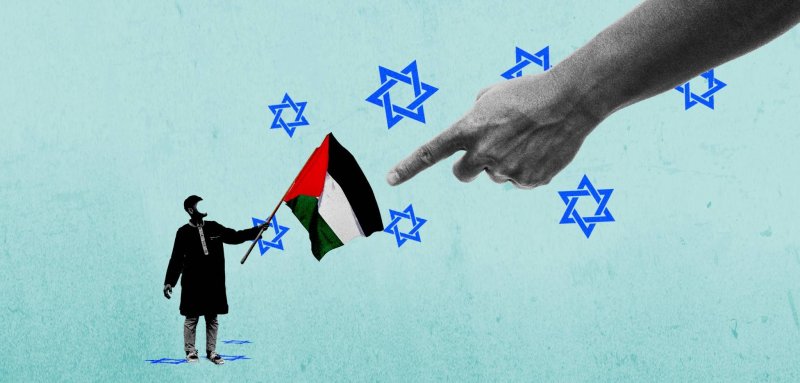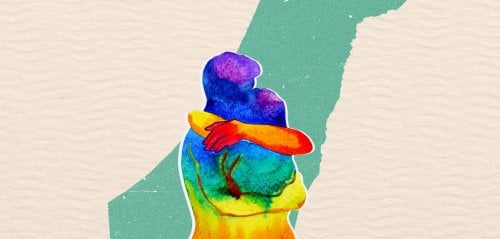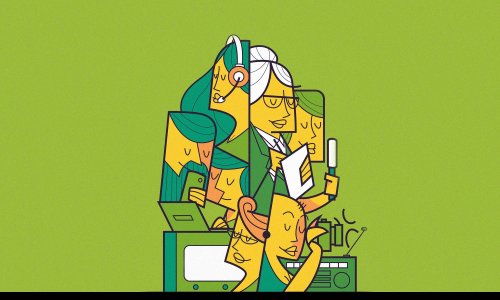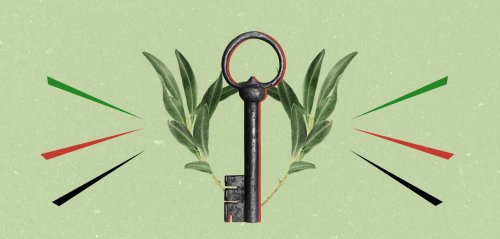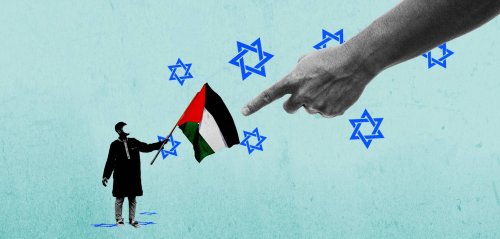After high school, students in Palestine— after having lived their entire life within the embrace of their village in the Palestinian Galilee, the Triangle region, or the Negev region — leave the embrace of their village and head towards the big Israeli occupied cities.
The two most prominent cities that students head to to pursue a higher education are Tel Aviv and Haifa — as opposed to the city of Jerusalem, which used to be the number one student destination in the past. This owes to the fact that out of all the cities with Palestinian and Israeli populations, the Arab community that resides within Jerusalem’s borders maintained a strong national and Arab identity.
Today, thousands of Palestinian students live in Tel Aviv, workers, and laborers that occupy different positions in the fields of medicine, academia, as well as restaurants and bars, among others. Tel Aviv, which does a great job of promoting its ‘soft’ and ‘minority-friendly’ face that strives to preserve the rights of those that are oppressed in their own societies, completely unravels in front of the young Palestinian man as soon as he becomes involved. The discrepancies in terms of treatment and presence cause a strong cultural shock to many Palestinians.
Under the liberal and tolerant guise of Tel Aviv, there are political agendas — both right wing and leftist — working to suppress and erase the Palestinian national, cultural, and religious identities. They press society into indirectly erasing the young Palestinian man or woman of the principles and ideals that had originally accompanied them to the city. These ploys impose new personas on the young Palestinian that often internalize within them destabilizing questions about their selves and identities. Conversely, the opposite may also occur; the Palestinian reacts by doubling down and sticking to his/her principles — becoming radicalized in his/her opposition to the Israeli.
The Veil in Tel Aviv
The veil is seen as a social restriction in many areas within the Palestinian interior. Every woman who abandons it is stigmatized and branded as sinful. People would always try to bring her back to the “right path” through their varying statements about the importance of the veil for women as a modest and chaste cover for them. On a personal level, because of my social activity as well as my activity on social media, I was afraid to take off the hijab for many years, not only in fear of my father’s reaction, but also because of society’s reaction. I had no inner psychological immunity to go through with this step. I lived my whole life in a very closed society, and upon leaving the village, I studied in the Negev in the south, where most of the people there could not accept the presence of a teacher that does not wear a headscarf. I reluctantly wore it for many years and took it off only a few months ago after I had the opportunity to experience complete distancing and alienation in the city of Tel Aviv.
Finally, I felt that I could get out of the empty shell that is Tel Aviv, the city that the occupation is trying to label as the number one safe haven for Palestinian youths fleeing the injustices of custom and tradition
However, despite the high ceiling of freedoms that the city provides, I never felt that it could truly embrace me, or could represent me or represent my convictions — it was only a cover for me that I could place between myself and my small village. Upon my return to the village, I was subjected to a scathing offensive from relatives and friends, with some of them even cutting me out of their lives. However, I finally felt that I could get out of the empty shell that is Tel Aviv, the city that the occupation is trying to label as the number one safe haven for Palestinian youths fleeing the injustices and oppressions of customs and traditions.
By contrast, Lama (pseudonym) says, “The city exerted great social pressure on me. I could not continue to keep wearing the headscarf under the pressure of the community. There were jobs and positions that I could not secure because of the hijab, and there were even student groups that refused to establish any strong ties or relationships with me because of the headscarf. At first when I took it off, I thought that it would now be possible for me to mix in and blend into this city, but with time I discovered that I had only taken it off because the city rejected me as a Palestinian Muslim.”
Siham (pseudonym) from the villages of the Galilee region says, “I wore the headscarf at a relatively young age due to the prevailing customs and traditions in the village. I had no other choice. Girls that did not wear the headscarf were seen as disrespectful and indecent. I confronted my father in high school, because I used to see the veil as something that represents things far from any of my own personal convictions. But I had to wear it so that my father would not deny me completing my studies and education.” She goes on, “When I began to study at the University of Haifa, I would take the bus there and then remove my headscarf when I reach the central station in Haifa. Nobody knew me there. I shied away from all social media platforms and sites so that I could preserve my alleged freedom in the city. But for many long years I lived in a dual identity. It did not allow me to show just one face.” Speaking of the family’s reaction when she finally decided to take off the veil, Siham says, “My father told me: ‘I am free of you until the Day of Judgment.’ He had appointed himself completely responsible for my life. Even though I am an adult — an educated and financially independent grown-up today — he refuses to talk to me or even contact me, despite the passing of many years since this incident took place.”
As for Shaza (pseudonym) from the villages of the Triangle region, she says, “I chose to study in Tel Aviv because it is relatively close to my village. I preferred to stay close to the family that never gave me any real answers to my questions. I was a curious girl, always looking past what is taken for granted and trying to find logical answers. My mother would always avoid answering my questions about God and religion. After I lived alone in the student dorms, and after I had examined a number of readings on philosophy and religion, I finally reached my decision to take off the headscarf.” She adds, “My father never accepted me. Even today, he refuses to talk to me. He says that I ‘put his head in the ground’ [let him down] and insists on staying under the structured frame that has been preset by customs and traditions. Being far from my family and my community, as well as the absence of Arab friends in my life, made me embark on a difficult path. Today, I am in a relationship with a Jew, but I am aware that this relationship is wrong and that with this, I am betraying my community and my people. I have reached this place as a result of me feeling lost in addition to society’s constant rejection of me.”
She goes on to say, “Tel Aviv? It was never a place with a nurturing or empowering environment. Instead, it is exactly what the occupation wants us to think, that it is the dream city; the place where we can escape to from family. But on the contrary, it again reaffirms to us the importance of holding onto our beliefs and our cause. What happened to me was not caused by living in Tel Aviv, it was caused by the injustice of society.”
I am in a relationship with a Jew, but I am aware that this relationship is wrong and that with this, I am betraying my community and my people. I have reached this place as a result of me feeling lost
Homosexuality in the “Pinkwashing” City
In what has become known as “pinkwashing”, Israel is trying to provide support for homosexuals in the country — whether they were Arabs, Jews, or even the people of the West Bank — through the use of Israeli and Zionist institutions in Tel Aviv. It is also doing so through the International Pride March that Tel Aviv annually organizes every June, as well as by projecting to the world the image of a warm and proper refuge for young men and women escaping their communities and their lack of acceptance. But what goes on behind the scenes is a completely different story.
Activist Siwar (pseudonym) from the villages of the Galilee region says, “I left the village when I was 19, young and not really knowing what my sexual orientation is. I decided to flee to Tel Aviv so that people would not bother me any more with questions about whether I had a boyfriend or not. I first came and took up residence in Ramat Aviv, the place that promotes itself to us as the perfect place for all those who are fleeing from their communities. I could not stand the fakeness and falsehood in this place — left-wing Jews claiming to be kind, and when they discover that you are an Arab through your accent, they back away immediately. I was not bothered by this, for I always made sure to define myself as a Palestinian. I was more interested in how I identify myself nationally than how I identify myself sexually.”
Siwar adds, “I volunteered for a good number of years at the Assiwar Organization supporting victims of violence due to their sexual orientation as well as battered women and victims of domestic violence. We used to take in cases that had received supposed assistance from Israeli institutions. These institutions would first provide support to these youths, then abandon them to face their fate alone. One of the most difficult cases I had to work on was of a young man from the West Bank. He was lured in by this institution to accept its support after being subjected to violence in his region. They brought him to Tel Aviv, and gave him a forged permit that neither allowed him to rent a house nor look for work there. So he ended up on the streets, sleeping by the seashore or in the corners of Jaffa in order to escape from the Israeli police so that they wouldn't arrest him and take him back to the West Bank, where he will be treated as a double agent, a spy, or a traitor.”
“I only took part once in Tel Aviv's so-called Pride March, not out of any confidence in what they preach and claim to be in front of the world. Israel spends millions of shekels on this gay march. Advertisements are prepared for the event in all capitals of the world, so it is not even possible for anyone not to hear about it. The march coincided at that time with the war on Gaza. My friend and I distributed leaflets to the participants about the killing, bombing, as well as the displacement of children, mothers and the people of the Gaza Strip — all this coinciding with Israel’s claim to support homosexuals in Tel Aviv. I will never forget the faces that day, how the tourists were shocked that this country — the country of ‘freedom’ — can do something like that,” says Siwar.
When the Palestinian student comes to Tel Aviv, the city pulls him in with its alleged freedoms, then soon the student discovers a large shell, under which the true oppressive, racist, and occupying Israel hides
Silencing the Palestinian Identity at Tel Aviv University
On the other hand, Israel believes that, by integrating Palestinian students into its universities, and in Tel Aviv in particular, it will be able to change these students’ affiliations by opening the way for them to integrate into Israeli society. Tariq Taha, a former member of the Jafra Student Assembly Movement at Tel Aviv University (TAU), says, “There are left-wing social patterns in this city that create a state of conflict between the Palestinian student and the city. When a Palestinian student comes to Tel Aviv, the city pulls him in with its so-called and alleged freedoms, then soon the student discovers a large shell, under which the true oppressive, racist, and occupying Israel hides.”
Tariq adds, “When I came to Tel Aviv University, I was called to have a ‘chat’ with security. What was hiding under that conversation is the Israeli Shabak [or the Shin Bet — the Israel Security Agency]. This interview or chat was aimed at breaking the national and patriotic voice that I was accustomed to raise in the village in the past. The agenda of the university did not succeed and nor did its attempts to suppress our identity by silencing us. While attending Tel Aviv University, I was called twice to its obedience committee. The first time was because of the presence of an Egyptian lecturer at the university, and we, as national student movements, had rejected his presence and considered him someone that is attempting to normalize with the occupation, so we drove him out of the university. The second time, I was summoned to the obedience committee for distributing political leaflets that were calling for demonstrations against the war on Gaza.”
“Tel Aviv University claims to be the best and most important at providing space for religious freedom and the performance of religious practices. This same university has closed down the Muslim prayer hall of the students there three times already. The last time the prayer hall remained closed down for many months, and students fought collectively for their right to pray. On the other hand, Jewish students have a large synagogue for them in the middle of the university. These forms of religious discrimination always try to rob Palestinians of their nationalism and their causes,” Tariq says.
For his part, Student Jamal Mustafa, who was arrested during one of the demonstrations, says, “The occupation’s police used my status as a student and threatened me in order to leave all forms of political activism, claiming that my political activity will affect my academic status in the country, especially as a student at Tel Aviv University.” He adds, “The arrest during the demonstration was not directed against me in particular. Rather, the main objective was to intimidate the students and deter them from any political action or activism. The proof of this is that after I was arrested, they left the students alone in the demonstration.”
Despite all of Israel’s attempts to beautify the city, and its efforts to place it in the center; as a defender of freedoms and as a place where a person can freely exercise his/her way of life, this mask however, unfolds as soon as a Palestinian Arab becomes involved. Tel Aviv can just be a bastion of freedoms for the Israelis; that could be enough, but it continues to suppress — with a soft, subtle hand — every Palestinian that tries to raise his/her voice in this city, while also trying, with all its agendas and strategies, to rob them of their beliefs and affiliations. In spite of this, the Palestinian youth — for the most part — valiantly refuse to be dragged behind the flimsy shell that the city is trying so hard to display to the world. On the contrary, the city and its duality turns into a reason that feeds into the feeling of a greater belonging to their nation.
Raseef22 is a not for profit entity. Our focus is on quality journalism. Every contribution to the NasRaseef membership goes directly towards journalism production. We stand independent, not accepting corporate sponsorships, sponsored content or political funding.
Support our mission to keep Raseef22 available to all readers by clicking here!
Interested in writing with us? Check our pitch process here!
